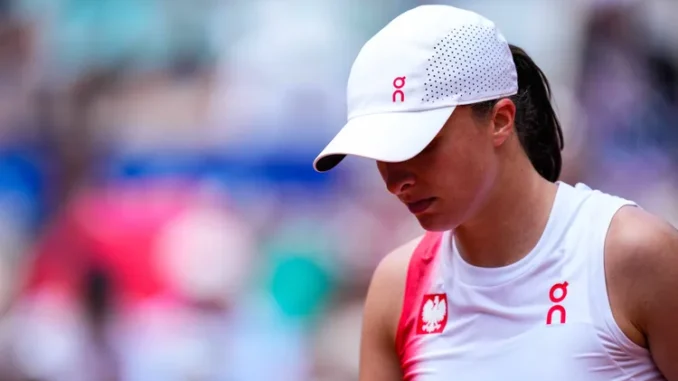
Iga Swiatek, the world-renowned Polish tennis star and former World No. 1, has made headlines not for her on-court performances, but for her candid condemnation of the Polish media. Swiatek recently opened up about the intense scrutiny and “crazy rumours” spread about her personal life and health during her brief absence from the tennis circuit. In a powerful statement, she expressed her frustration with the media’s reckless speculation, including unfounded claims about her mental health, and called for greater respect for athletes as individuals outside their professional roles.
The controversy began during a short break Swiatek took to recover from a demanding season. The 22-year-old, who has consistently been one of the top players in the world, opted to prioritize her physical and mental well-being by stepping back briefly from competitive tennis. While breaks like these are not uncommon for athletes, they often become a breeding ground for speculation, especially when the individual in question is as prominent as Swiatek.
Polish media outlets quickly seized the opportunity to fill the information vacuum with rumors, some of which claimed she had been diagnosed with mental health disorders. These rumors spread rapidly, prompting widespread discussions among fans and commentators alike. However, Swiatek herself had said little publicly during her time away, focusing instead on her recovery and preparation for upcoming tournaments.
When Swiatek finally addressed the issue, her response was both direct and heartfelt. In a social media post, she criticized the media’s invasive and irresponsible behavior. “They diagnosed me with mental health disorders,” she wrote, condemning the baseless rumors that had circulated. She emphasized that such unfounded speculation not only undermines her privacy but also trivializes the serious issue of mental health, which affects countless individuals around the world. Her statement resonated deeply, sparking conversations about the treatment of athletes by the media and the broader implications of such behavior.
Swiatek’s frustrations are understandable, given the immense pressure she faces as a professional athlete and public figure. The life of a top-tier tennis player is grueling, with an intense schedule that often leaves little room for rest or personal time. For someone as young as Swiatek, balancing the demands of global fame with the pressures of competition is no small feat. Taking time to recharge physically and mentally should be seen as a sign of maturity and self-awareness, yet it is often met with skepticism and criticism.
The issue of mental health in sports has gained significant attention in recent years, with numerous athletes speaking out about the challenges they face. Naomi Osaka, Simone Biles, and Michael Phelps are just a few examples of high-profile figures who have shared their struggles, helping to break the stigma around mental health. Swiatek has also been vocal about the importance of mental well-being, often highlighting how her work with a sports psychologist has been integral to her success. However, this openness has sometimes been misinterpreted or misused, as demonstrated by the recent rumors.
By addressing the situation head-on, Swiatek has not only defended her own integrity but also highlighted the broader issue of media sensationalism. The spreading of false information can have serious consequences, not just for the individual targeted but also for public perception of sensitive topics like mental health. In Swiatek’s case, the rumors not only invaded her privacy but also risked creating a narrative that could detract from her achievements and misrepresent her character.
Her statement has sparked a broader debate in Poland and beyond about the responsibilities of the media. While journalism plays a crucial role in keeping the public informed, there is a fine line between reporting and speculation. When that line is crossed, it can lead to the dissemination of harmful misinformation. Swiatek’s call for accountability serves as a reminder that public figures, despite their fame, are human beings who deserve respect and empathy.
In addition to her criticism of the media, Swiatek has used this moment to reaffirm her commitment to promoting mental health awareness. She has often spoken about how her mental approach has been a key factor in her rise to the top of the tennis world. Her success on the court is a testament to her resilience, discipline, and ability to maintain focus under pressure. By sharing her journey, she has inspired many fans and young athletes to prioritize their mental well-being alongside their physical health.
As Swiatek prepares to return to competition, her focus remains on what she does best—playing tennis at the highest level. Her fans are eager to see her back on the court, where she has consistently dazzled with her skill, determination, and sportsmanship. While the media frenzy around her break has been an unfortunate distraction, it has also underscored the challenges faced by athletes in the modern era.
Swiatek’s response to the rumors serves as a powerful reminder of the need for compassion and understanding. Athletes are not just entertainers; they are individuals with their own struggles, aspirations, and vulnerabilities. By standing up against the spread of misinformation, Swiatek has not only defended herself but also set an example for others to follow.
In the end, this episode may well strengthen Swiatek’s resolve as she continues to build her legacy in tennis. Her willingness to speak out, coupled with her exceptional talent and work ethic, has only deepened the admiration of her fans. As she returns to the court, she does so with the support of a global community that respects her not just as an athlete, but as a person who values integrity and truth.
Leave a Reply